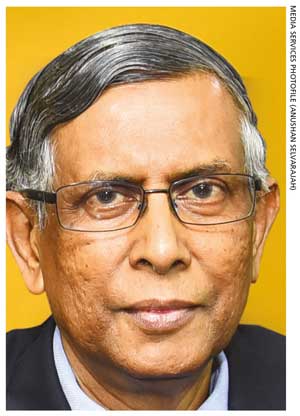EDUCATION SECTOR
Compiled by Savithri Rodrigo
WHY OUR EDUCATION FAILS!
Sri Lanka Sikhamani Prof. Lakshman Watawala critiques our education system

Q: How would you rate the quality of education and skills development in Sri Lanka?
A: While education must be mapped in line with needs, whether they’ve been properly identified is in question.
The quality of education can be measured at various levels. Those who fail their O-Level exam must have suitable study options. Presently, A-Level students enter the science, maths, commerce, technology or arts streams, and nearly all of them attend tuition classes, which implies that there are gaps in the education system.
Competitiveness compels students to attend these classes. Only 15 percent enter universities while the rest pursue higher studies at advanced technical institutes and private universities or through professional courses.
Q: So has our education system rendered young people unemployable?
A: Engineering, science, maths, IT, accounting, management and economics students are in demand, but those in the arts stream aren’t, as they tend to lack English language and communication skills, as well as practical training and exposure to business and commerce. This is especially the case among rural students.
The public sector is politicised and overstaffed, being the main avenue of employment for clerical fields. Other skills are in demand locally and overseas, creating value in the private sector.
Q: What should policy makers do to address what you have said so far?
A: They must build a knowledge pool to showcase strengths in IT, engineering and data analytics, to promote foreign direct investment (FDI) in industry, business process outsourcing (BPO) and knowledge process outsourcing (KPO), and skilled and specialised industry. This requires training and development, and the establishment of relevant entities.
Q: How can the strengths of youth be optimised?
A: Higher academic pathways to university or technical institutes and the completion of courses within set timelines are vital. Exam dates should not change and terms must be fixed. There’s no proper link between the school, higher education, and vocational and skills education systems – they work independently.
Undergraduates must enter university at 18 or 19 and graduate by 22 to be employed at a trainable age. The private sector requires graduates who are flexible and can communicate well.
Q: And how does education in Sri Lanka compare with South Asia as a whole?
A: Sri Lanka’s education system is plagued by political interference and many nations in the region have overtaken us. India encourages higher education with youth completing degrees by 21, and moving on to MBAs and professional courses; it’s also home to specialised higher education institutes.
In the last decade, one million Sri Lankan youth lost the opportunity to undertake higher education. We need to revamp universities by granting control to vice chancellors, professors and academics, and assign the task of setting up university colleges to them. The University Grants Commission must have a free hand, and be accountable and transparent. This will increase the university intake by 50 percent.
Establish 200 IT training centres islandwide as public-private partnerships to provide IT knowledge to rural youth and extend this to fields of specialisation, following discussions with business chambers and the private sector.
Q: What are the gaps in education?
A: These include the non-availability of science, technology, engineering and mathematics (STEM) curriculums in the island’s rural sector; poor communication and vocational skills; and the shortage of faculties and facilities.
Students and graduates are unemployable due to a lack of practical knowledge. The pedagogy must include practical experience.
Integrating skill development into the education system is essential even in secondary education. Education must encompass commercial exposure, problem solving and continuous professional development. Facilities must be upgraded in both urban and rural schools.
Q: Which industries and sectors need skills development?
A: Hospitality and tourism, handicraft, healthcare, textile, apparel, photography, IT, retail, banking, accounting, insurance, engineering and construction, and technical professional solutions require communication and English language skills, to give jobseekers confidence. This would improve salaries locally and abroad.
A can-do approach and discipline are crucial. To boost productivity, technology must be introduced along with industry and skilling partnerships, as well as waste management, accountability and eschewing corruption.




